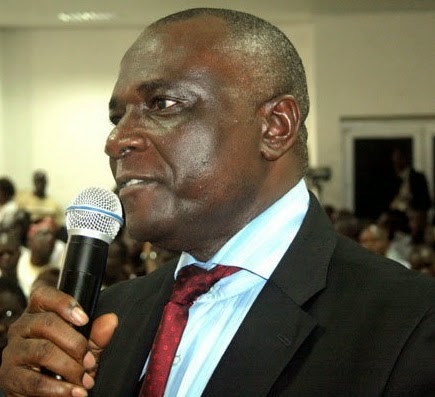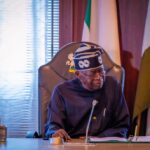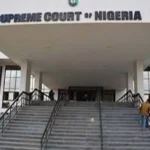For the second time in 24 hours, the Presidency has fired back at former President Olusegun Obasanjo over his recent criticism of President Bola Tinubu’s government.
Speaking at the Chinua Achebe Leadership Forum which held at Yale University, Obasanjo described Nigeria as a failed state, saying the “Emilokan” policy of the present administration was not delivering the desired results.
He also accused the current administration of unprecedented level of corruption, demanding an overhaul of the Independent National Electoral Commission (INEC).
Sunday Dare, Special Adviser to President Bola Tinubu on Public Communication and Orientation, had fired the first shot at the former president, saying Nigeria’s democracy endured severe setbacks under him.
- Niger Delta Youths Slam Obasanjo Over Call for INEC Chairman’s Removal
- Growing population: Nigeria needs 800 universities to meet academic requirements – Prof
In a statement on Monday, Dare claimed that successive administrations struggled to rectify the damage left by Obasanjo and that President Tinubu was making significant progress in addressing these issues.
Dare said Obasanjo had lost moral authority to criticise the current government, stressing that he should apologise to Nigerians for failing to lay the necessary infrastructure for the country’s progress.
On his part, Bayo Onanuga, Special Adviser to the President on Information and Strategy, urged Nigerians not to take Obasanjo seriously, saying he is not a good leader to emulate.
He accused Obasanjo of brazen illegality and assault on the Constitution, saying during his tenure, “the unconstitutional impeachment of four governors who belonged to his party occurred”.
Below is Onanuga’s full statement:
In a recent display of his characteristic self-importance, former President Olusegun Obasanjo once again took to the public stage to bestow his unsolicited wisdom on leadership and governance in Nigeria. From his lofty perch, he blamed those who served after his tenure for the nation’s myriad challenges.
Unfortunately, the former leader’s habit of casting aspersions on every subsequent administration has devolved into a recurring pastime, overshadowing the expectation of an elder statesman to join a constructive dialogue on attaining national progress.
In his latest critique of the administration of President Muhammadu Buhari, whom he pejoratively called ‘Baba Go Slow’ and President Bola Tinubu, who he tagged ‘Emilokan’, Chief Obasanjo used the platform provided by Chinua Achebe Leadership Forum at Yale University to unfurl his latest treatise on leadership and public morality. He also used the forum to write off Nigeria as a failing country.
The irony of Chief Obasanjo using the platform that celebrates Achebe to sermonise on the ideals of good governance, statecraft, economic management, and corruption should be apparent to discerning minds. When he was alive, Chinua Achebe was a universally acclaimed moral, cultural and literary icon with scant regard for Obasanjo.
It is on record that Professor Achebe rejected the third highest national honour bestowed on him by the Obasanjo-led administration in 2004 on the grounds of the prevalence of abuse of power, corruption, poor leadership, and, in particular, state-sponsored brigandage endorsed by Chief Obasanjo in Achebe’s home state of Anambra. In Anambra, the former president actively supported the abduction of a sitting governor, Dr Chris Ngige, by non-state actors led by Chris Uba, a younger brother of Obasanjo’s senior aide.
In rejecting the 2004 national honour by the Obasanjo administration, Achebe declared: “Nigeria’s condition today under your watch is…too dangerous for silence. I must register my disappointment and protest by declining to accept the high honour awarded me in the 2004 honours list.”
Brazen illegality and assault on the Constitution of Nigeria reached a disturbing height under the leadership of Chief Obasanjo. During Obasanjo’s era, the unconstitutional impeachment of four governors who belonged to his party occurred. The governors impeached by minority members of the Houses of Assembly were Joshua Dariye of Plateau, Rashidi Ladoja of Oyo, Ayodele Fayose of Ekiti and Diepreye Alamieyeseigha of Bayelsa. A man under whose watch all of these egregious infractions occurred should certainly not be the one to give any lecture on leadership and corruption. He should not be taken seriously as he reeks of profound hypocrisy of the worst form.
Former President Obasanjo has continuously pumped himself up as the economic wizard of Nigeria. But a reality check showed he was nothing of such. He left unresolved many, if not all, of the problems of Nigeria, which he itemised in his lecture. He even recently admitted that his government made a mistake by not focussing on gas development, as the Tinubu administration does today. All oil and gas players know that Nigeria has more gas than oil. The only positive of the Obasanjo era was fiscal and monetary policy management buoyed by a consistent rise in crude oil prices throughout his eight-year tenure. This rise in crude oil prices started in 2000 and peaked in 2013 when it reached over 100 dollars per barrel before a decline in 2014, which set the oil-dependent economy downward. The current economic crisis the All Progressives Congress administrations have been battling since 2015 is the product of the poor choices in economic management made by Obasanjo and the two successors from his party. Obasanjo prides his government on paying the $15 billion debt owed to the Paris Club. Still, it was not a wise decision as it was done when the country’s critical economic infrastructure across sectors was in shambles.
While oil receipts brought money into the country, Obasanjo failed to fix the deplorable federal roads or expand the national road network. He did not repair the Lagos-Ibadan expressway, the Lagos-Abeokuta road leading to his hometown in Abeokuta, the Otta-Idiroko road, and many others.
His administration also should have paid more serious attention to universities and polytechnics. In a joint vote of no confidence in our tertiary institutions, Obasanjo and his deputy, Atiku Abubakar, sought to profit from their weaknesses by establishing their private universities. As a sitting President, Chief Obasanjo abused his office to advance personal interest against the spirit and letters of our constitution when he corralled leading businessmen, women and government contractors to donate billions of naira for his Olusegun Obasanjo Presidential Library and Resorts in Abeokuta and his Bell University in Otta.
After wasting billions of naira on a failed third-term project in 2007, Chief Obasanjo hurriedly organised a sham electoral process that would go down in history as the most fraudulent election held in Nigeria since 1960. The beneficiary of the sham election, Umaru Yar’adua, admitted that the election was seriously flawed and, as Justice Muhammed Uwais’s panel recommended, worked towards electoral reforms. It is hypocrisy writ large when a man who presided over the worst election in Nigeria demands the sack of the leadership of the Independent National Electoral Commission.
For eight years, the Obasanjo administration made no significant investment in security by modernising the Armed Forces. He did not redesign the national security architecture or change the military doctrine. The most critical investment in our armed forces, especially the military, since the administration of President Shehu Shagari in 1980 was made by the APC-led administration of President Buhari from 2015-2023. When President Buhari assumed office in 2015, the Air Force had fewer than three serviceable fighter jets, and the Navy barely had one serviceable vessel. Within eight years, President Buhari acquired over 40 new fighter jets of different capabilities, including 12 Tucano jets. He also acquired naval ships to strengthen the Navy. The APC administration of Buhari developed the air wings of the Army and Navy and changed the entire Armed Forces into one of the most potent fighting forces in the world.
President Tinubu has continued to sustain the same support and funding to the military and other security agencies. It is the reason the country is winning in the multi-pronged fight against Boko Haram terrorists, bandits, kidnappers, and other perpetrators of violent crimes. In the last year, over 400 terror and bandit kingpins have been eliminated, and thousands of Nigerians have been freed from their abductors. The insecurity that engulfed Nigeria started under the Obasanjo administration with militancy and kidnapping of expatriate oil workers in the Niger Delta, which later became a festering wound from which the nation has not recovered. Boko Haram, which became a violent movement in 2009, began its build-up under Obasanjo’s regime.
On matters of integrity, honesty, and morality in public leadership, Chief Obasanjo is certainly not a paragon of virtue for anyone to model after. Nigerians can still remember the messy public spat between Chief Obasanjo and his then-vice president, Atiku Abubakar, over PTDF money that led to a Senate Public Hearing in 2004. The sordid details of the public hearing included unsettling evidence of how Obasanjo instructed his Vice President to buy Sport Utility Vehicles for his mistresses with PTDF funds. There was also the Halliburton bribe scandal, which the US Congress probe revealed. Bribe payments were made to the highest political authorities at the Villa while Obasanjo was in charge.
Nigerians will also remember how the Obasanjo administration invested $16 billion on electricity, which left the country in utter darkness. The colossal amount spent on power was so embarrassing that President Umaru Musa Yar’Adua, Obasanjo’s successor, ordered a probe. Similarly, Obasanjo’s privatisation programme was scandalous. It did not deliver real value for the country. His administration cheaply sold national assets to cronies who stripped the assets of the state-owned enterprises. A case in point was the aluminium smelter company ALSCON in Ikot-Abasi, Akwa-Ibom State, built by the military government at the princely sum of $ 3.2 billion. It was sold for 130 million dollars. Obasanjo also sank money into Turn Around Maintenance of our refineries, which never worked, leading to the massive importation of refined petroleum products.
Such was the miasma of corruption under Obasanjo that the former governor of Abia, Orji Uzor Kalu, his party member, petitioned the EFCC, accusing Obasanjo of gross abuse of office.
If Chief Obasanjo had addressed the many problems he critiqued in his poorly written Yale lecture when he ruled Nigeria for eight years, President Buhari and President Tinubu would have had a much lighter burden of fixing the country.
While the Tinubu administration diligently works to overcome the country’s economic challenges, it would be better and more advisable for former President Obasanjo to temper his self-righteousness in his public discussions regarding our nation’s temporary difficulties. Instead, his remaining years would be better spent reflecting on the missed opportunities during his own time in leadership, both as military head of state and civilian president.

 Join Daily Trust WhatsApp Community For Quick Access To News and Happenings Around You.
Join Daily Trust WhatsApp Community For Quick Access To News and Happenings Around You.


